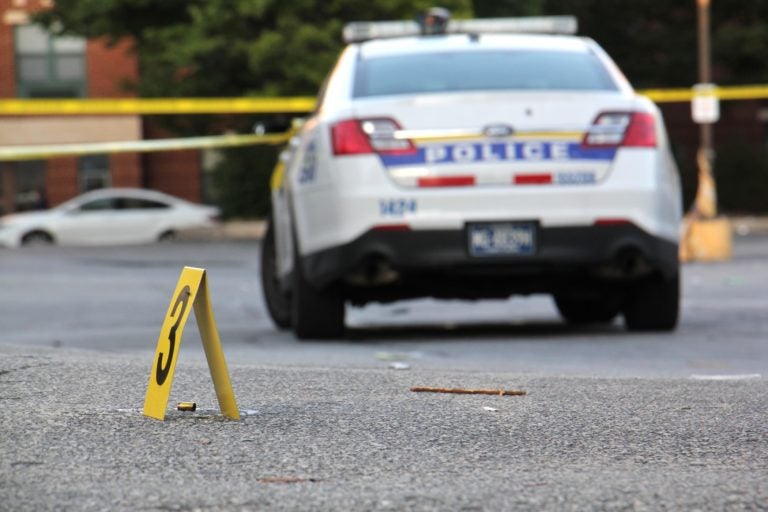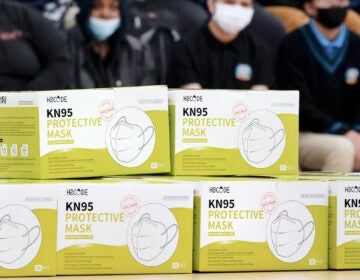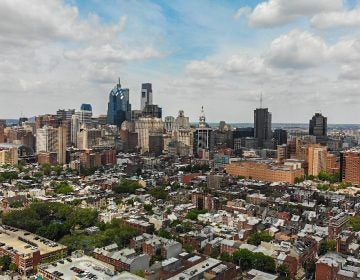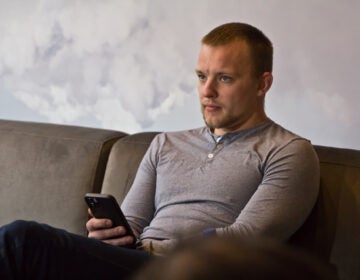Violent crime dipped in Philly last week. Anti-violence advocates want that dip to last
Long before the coronavirus pandemic reached Philadelphia, advocates were on the front lines of another crisis: gun violence.
Listen 4:23
Police investigate a drive-by shooting in Germantown on Oct. 3, 2018. (Emma Lee/WHYY)
If you or someone you know has been affected by gun violence in Philadelphia, you can find grief support and resources here.
Philadelphia’s streets are much quieter these days, with residents ordered by the governor and mayor to stay home unless it’s absolutely necessary to help prevent the spread of COVID-19.
That’s made a big part of George Mosee’s job easier.
“People are actually at home,” said Mosee, executive director of the Philadelphia Anti-Drug/Anti-Violence Network, or PAAN, which is considered by the state of Pennsylvania to be a life-sustaining business.
Long before the coronavirus pandemic reached the city, PANN was on the front lines of another crisis: gun violence. For the last three years, Philadelphia has seen an increase in homicides, with 356 people killed in the city in 2019, the highest number since 2007. The city has also been stuck in a bloody cycle of shootings, several of which landed innocent children in the hospital or a city morgue.
Now, Mosee’s staffers are risking their personal safety to keep hospital beds open for COVID-19 patients. Even as violent crime dipped in Philadelphia last week, the number of shootings barely budged — there were 66 last week, and 65 the week before.
Seven days a week, Mosee sends dozens of outreach workers to some of the most violent areas of the city to offer young men and women alternatives to leading a life of crime.
The group offers internships, but also job training programs with agencies like SEPTA and organizations such as the Philadelphia Opportunities Industrialization Center, a nonprofit that helps low-income residents and people experiencing homelessness become self-sufficient.
It’s usually difficult for Mosee’s staffers to find the people they’ve targeted for outreach at home, including drug dealers believed to be fueling neighborhood gun violence, and at-risk youth on the verge of going down that path.
That’s changed dramatically since the city issued a stay-at-home order, which took effect Monday and urges residents to remain inside unless they need food or medical attention or work at a life-sustaining business.
“Around 3 out of every 10 home visits would result in actually making contact with the person we were looking for,” Mosee said. “Now, it’s probably around 80, sometimes 90%.”
Social distancing has moved these conversations out of homes and into doorways and the streets, with outreach workers sometimes wearing latex gloves or paper masks. And PAAN’s Community Crisis Intervention Program is as busy as ever, he said.
The challenge is that most of the programs the nonprofit pitches as alternatives aren’t hiring right now as the city works to contain the virus. That means PAAN’s violence interrupters can only line people up for the day when those businesses and programs are back online — whenever that day comes.
To a drug dealer making easy money now, an indefinite wait may be a tough sell.
“If you don’t have an alternative that promises immediate income, then it’s going to be very difficult to get them to consider the change,” said Mosee. “Sometimes, you have to say, ‘You gotta do what you gotta to do, but we’re gonna be there and I’m gonna come back and check on you.’”
Violent crime dips. Will it last?
Overall crime in Philadelphia is still up 16% over the same period in 2019, according to police. But last week, as the number of confirmed cases of COVID-19 surged in the city, both property crime and violent crime decreased compared to the previous week.
Property crime dipped 3%. Violent crime was down 14%.
That happened despite concerns about lawlessness after the police department announced it would be delaying arrests for nonviolent offenses during the crisis.
The Philadelphia Police Department recorded just one homicide last week. There were 12 between March 9 and March 15, including the killing of Sgt. James O’ Connor, who was fatally shot in Frankford while his SWAT unit was trying to serve an arrest warrant for a man accused of murder.
Experts predict crime in Philadelphia and other big cities across the country will gradually continue to decrease as the coronavirus continues to spread and stay-at-home orders remain in place.
Crimes of opportunity, including armed robbery, typically require people to be out on the street.
The majority of gun violence happens outside.
“In terms of street-level violence, it might dissipate because it’s harder for people to sell drugs when the streets are empty and the only other people out there are the police,” said Jerry Ratcliffe, a criminal justice professor at Temple University.
Commercial burglaries could very well increase, experts said, and advocates for domestic violence victims are bracing for a surge in calls for help as people are forced to stay indoors with potential abusers.
If there’s a fly in the ointment, it’s human nature.
For now, city residents are more likely to adhere to warnings from health officials to stay inside and limit contact with groups of people. But that could change the longer these shutdown conditions persist, said Sarah Bass, a social and behavioral sciences professor at Temple University.
“When our risk perception is heightened, as it is right now, we are more likely to want to do things to give us a sense of control, but that is not a natural state,” she said. “Most of the time, we maintain an optimism bias to get us through the day. As we see fewer cases or deaths, we will naturally want to get back to that place because it feels more comfortable emotionally.”
Mosee said drug dealers have been ignoring the city’s coronavirus messaging all along. They’re still out on the street conducting business.
Dorothy Johnson-Speight, founder of the anti-violence group Mothers-in-Charge, expects that to continue as long as the pandemic persists. Why wouldn’t it?
“If you’re out there committing crime, you’re not worrying about getting a citation for being outside,” said Johnson-Speight. “This is not going to be a deterrent for you. I hope I’m wrong.”
The city, for its part, isn’t interested in weighing in on how the coronavirus pandemic will impact crime.
“It would be foolhardy to start making predictions about any trends, crime or otherwise, based on the current situation, as it is unprecedented,” said mayoral spokesperson Mike Dunn.
It’s pretty clear, though, that Philadelphia Mayor Jim Kenney desperately wants to see criminals ease up during the pandemic — for everyone’s sake, including their own. Researchers say the city could need at least twice the number of hospital beds that it currently has.
“To the shooters, imagine it being your daughter, your mother, your grandparent that needs a hospital bed because of coronavirus, but instead you’re sending someone to the ER with a bullet wound,” Kenney said during a news conference on Sunday. “Think about that before you raise your gun.”
WHYY is your source for fact-based, in-depth journalism and information. As a nonprofit organization, we rely on financial support from readers like you. Please give today.




![CoronavirusPandemic_1024x512[1]](https://whyy.org/wp-content/uploads/2020/03/CoronavirusPandemic_1024x5121-300x150.jpg)


